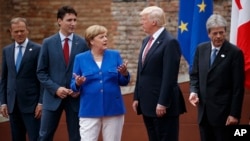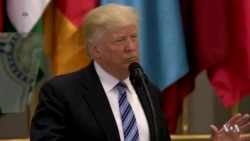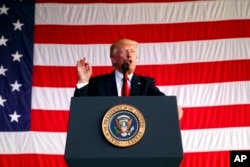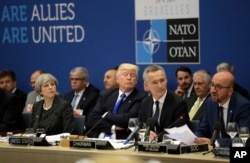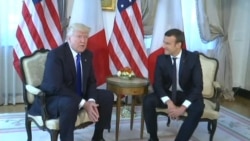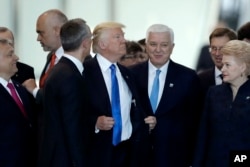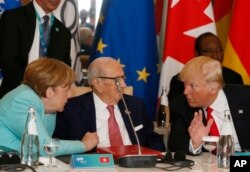White House press spokesman Sean Spicer declared Saturday night Donald Trump’s first overseas trip as U.S. president had been a success in a tweet posted as the American leader was flying back to Washington “after very productive 9 days.”
Just hours earlier President Trump told American troops stationed in Sicily he had strengthened bonds with allies.
That isn't how Europe leaders and most of the continent’s media see it.
German Chancellor Angela Merkel spelled out publicly her fears that the traditional western alliance is now under threat both from the Trump presidency and Brexit.
Speaking at a rally in Germany, she said: “The times in which we can fully count on others are somewhat over, as I have experienced in the past few days.”
While acknowledging that Germany and Europe should strive to maintain good relations with the U.S. and Britain, Merkel also said, “We need to know we must fight for our own future as Europeans for our destiny.”
European reaction — especially in the key capitals of Berlin and Paris — to the Trump visit is very different from the White House’s characterization; and "success" isn’t a word being used.
European officials say they now are convinced Europe will have to go it alone more — something they expected would be the case after Trump was elected.
For them, Washington is no longer the dependable ally. And that broadly has been the view of Europe’s press. Headlines all week have been providing a counterpoint to the White House version of meetings. Belgium’s Le Soir headlined one front-page story: “Trump shoves his allies.”
And Germany’s financial newspaper Handelsblatt dubbed him “Boor-in-Chief.”
Disappointment
The Europeans had hoped Trump’s visit might mark a reset in transatlantic relations roiled by his election — that the U.S. president would be persuaded to see the world through their eyes more. But from Brussels to Sicily, there were uneasy smiles, awkwardness and no disguising rifts on a range of issues — from trade and immigration to sanctions on Russia and climate change.
European leaders and officials complained to the media that Trump and his advisers were ignorant of basic facts, notably on transatlantic trade. “Every time we talked about a country, he remembered the things he had done,” one official told Belgium’s Le Soir. “Scotland? He said he had opened a club. Ireland? He said it took him two-and-a-half years to get a license and that did not give him a very good image of the EU.”
German officials told Süddeutsche Zeitung that Trump and his aides were under the impression America had separate trade deals with each individual EU country.
'America First' message
France’s Le Monde newspaper said: “During this visit, President Trump maintained his line ‘America First,’ refusing to take a step to improve U.S.-European relations.” It faulted him for failing to make a clear statement reaffirming Article 5 of the NATO Treaty, guaranteeing mutual assistance in the event of armed attack, and for lecturing European leaders on financial burden-sharing.
The German magazine Der Spiegel pounced on the closing photo-op of a midweek meeting between Trump and newly elected French President Emmanuel Macron in which the two men appeared locked in a hand-wrestling match as a visual metaphor of the U.S. president’s European trip.
WATCH: Trump Meets French President Macron
“The Frenchman grabbed Trump's hand and squeezed hard,” the magazine noted. “Trump squeezed back. For a moment, they looked like opponents locked in a wrestling match. Trump wanted to let go, but Macron squeezed even harder until his knuckles turned white,” was the Der Spiegel’s description of an iconic almost sumo-like standoff between the two leaders.
Body language
Other European media outlets focused their attention on the shove President Trump gave Montenegro’s prime minister, Dusko Markovic, in order to position himself to the front for a group photo-opportunity of NATO leaders.
Aside from body-language, European media attention Saturday focused on the brevity of the communiqué concluding the two-day G-7 summit in Sicily Saturday — half-a-dozen pages long, compared to 32 pages last year — which many editorial writers saw as advertising the absence of consensus between the U.S. and the other G-7 members.
Trump’s refusal to reaffirm the 2015 Paris pact on climate change aimed at reining in greenhouse gas emissions was the headline dispute of the G-7 summit in the cliff-top town of Taormina on Sicily’s Ionian coast, but European commentators noted that across the board there was very little meeting of minds.
Italian newspapers noted the disappointment of Prime Minister Paolo Gentiloni in his efforts to get U.S. backing for a new partnership between G-7 nations and Africa involving aid and investment in a bid to stem the flow of migrants across the Mediterranean.
Deadlock over climate change
European newspapers have now taken to dubbing the G-7 as "G-6 plus one" — a characterization prompted partly by German Chancellor Angela Merkel’s remarks on the summit deadlock over climate change.
“The whole discussion on the topic of climate was very difficult, not to say very unsatisfactory,” Merkel said as the summit of the leaders of the world's most economically advanced nations was drawing to a close. “Here we have a situation of six against one, meaning there is still no sign of whether the U.S. will remain in the Paris accord or not," she added.
The Guardian newspaper’s Jon Henley, the paper’s European affairs correspondent, argued in his assessment of Trump’s visit: “It may, mercifully, have passed off without apocalyptic mishap, but Donald Trump’s first transatlantic trip as U.S. president still left European leaders shaken.”




